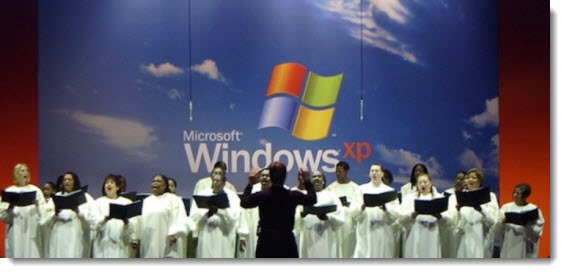In exactly one year, Microsoft will stop supporting Windows XP. There will be no more security updates or patches. Microsoft will stop answering the phone. No more technical support bulletins will be published. Support will also end for Office 2003.
If you’re still using Windows XP in a year, you’ll be at far greater risk for security breaches, and you’ll be dealing with a steady stream of programs and devices that just don’t work.
It’s not a surprise. Microsoft has had a product lifecycle for the various versions of Windows for more than ten years. This deadline hits procrastinators harder because Windows XP keeps working, more or less – slowly, oh so slowly, as time goes by, but you’ve been putting off the inevitable as long as possible despite my urging.
Now it’s really over. The Windows XP computers have to go. I’m going to be sarcastic and irritable if any of you are still running a Windows XP computer in a year. It costs less than a thousand dollars to get a new desktop computer and widescreen monitor, plus a little time to set it up and move data from the old computer. Put it in the budget for 2013. Don’t fight. Just do it.

Hey, sing the praises of Windows XP before its final bow, if you like! It was a wonderful operating system. I was already writing articles for Bruceb News in October 2001 when Windows XP became available, and it was an exciting time. One of my articles from two weeks before the release:
“There’s a lot of things to like about Windows XP. If you’re a Windows 98 or ME user, the single overriding issue is that Windows XP doesn’t crash. It just doesn’t. Another thing that hasn’t gotten as much coverage is that it’s very fast. It takes a fraction of the time to start up the computer compared to other versions of Windows, and applications run faster than they ever have before. . . . I’ve used Windows XP Home and Professional and I can report that this is not hype, folks, it’s absolutely true, and you’ll like it a lot.”
For perspective, it’s worth noting that a lot of people hated Windows XP when it was released because of the changes from good old familiar Windows 98. (A long memory helps when I hear complaints from people who hate Windows 8 because of the changes from good old familiar Windows XP.) It’s easy to forget that the original release of Windows XP turned out to be a security mess, causing Microsoft to halt virtually all development until it implemented its Trustworthy Computing Initiative, which focused intensely on security. Windows XP didn’t truly come into its own until three years later when Service Pack 2 arrived in August 2004 with enough changes to be effectively a completely new operating system.
It’s 2013, a long decade later, in a different world. If you’re still running any Windows XP computers, deal with your emotions. Go through the Seven Stages of Operating System Anxiety (anger, depression, denial, poverty, regret, grumpy, and sneezy). Then call me so we can just do what has to be done.

